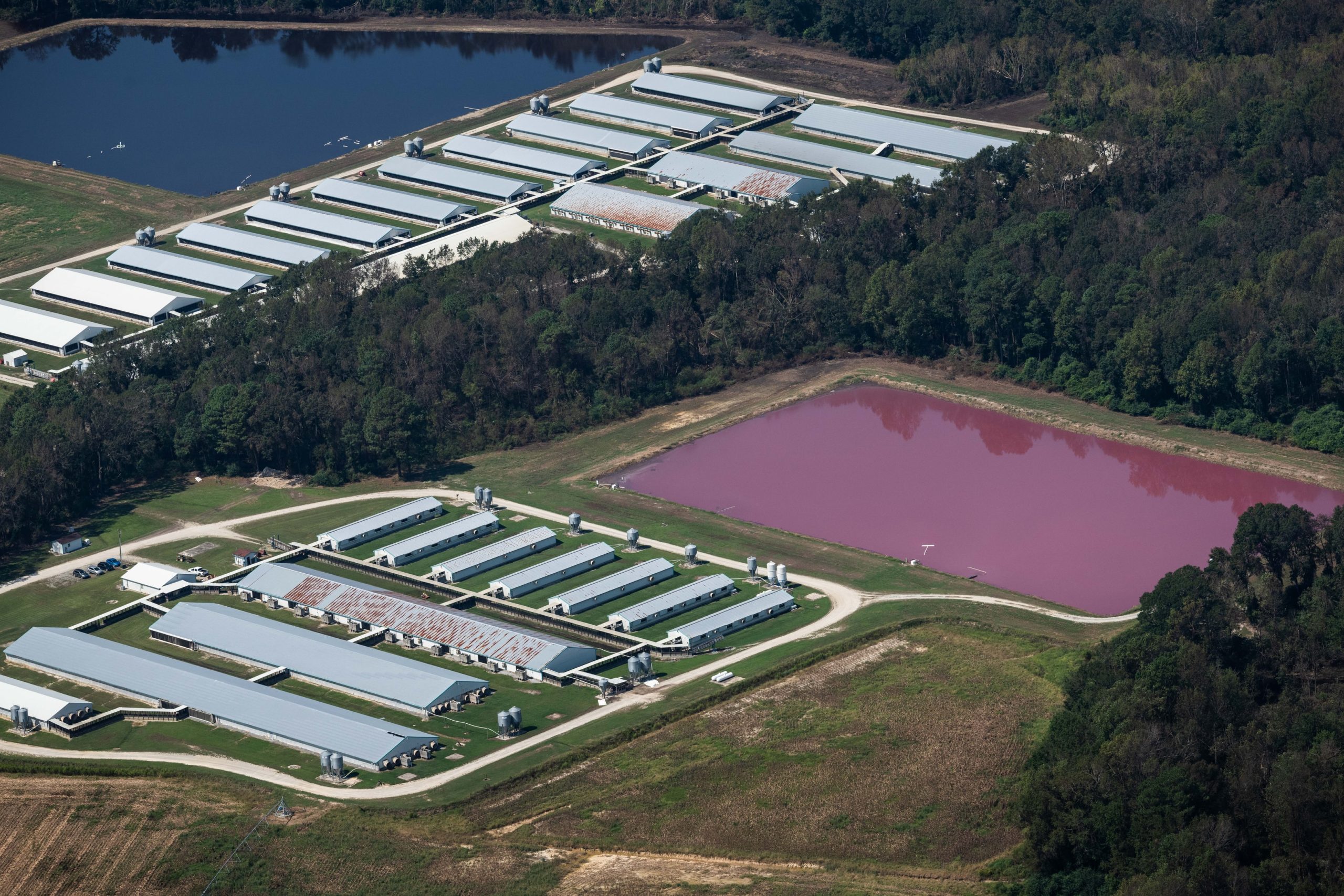 Christelle Blunden is a GP, environmental activist, and founder of healthdefends.org.
Christelle Blunden is a GP, environmental activist, and founder of healthdefends.org.
The climate and ecological emergency is a public health emergency on every level from increasing the length of the hayfever season to mass international migration, food insecurity, and changing weather patterns leading to changing patterns of disease. It is nothing less than the biggest challenge humanity has ever faced.
Alongside that we have the short-, medium-, and long-term challenges of increasing antibiotic resistance and emerging pandemics. Efforts for prevention at a national and international level currently fall short of a frank discussion around significant root causes of all of the above — the way we treat animals.
I’m a GP and founder of Health Defends, an organisation set up to support legal challenges to the UK government on climate change by bringing a medical perspective. As part of our exploration of the current litigation scene we came across an organisation called Humane Being, founded by a dedicated farmer putting her house on the line to fund a legal case against factory farming based on human rights arguments. The co-plaintiff is an ex-vet who left the profession out of disgust for the conditions of animals in intensive agriculture. Together they have compiled a 305-page research paper on the contribution of intensive farming practices to these public health crises we face. I’ve learnt a great deal from them. Brace yourself for some incredible myth-busting!
‘[The climate emergency] is nothing less than the biggest challenge humanity has ever faced.’
A staggering 82% of the world’s starving children live in countries where food is fed to animals that are then killed and eaten by more well off individuals in developed countries like the US, UK, and in Europe.1 In 2019, Hans-Otto Pörtner, co-chair of The Intergovernmental Panel on Climate Change working group II, stressed the need for a change to land use stating that ‘land already in use could feed the world in a changing climate’.2 Joseph Poore of Oxford University concluded that 83% of global farmland is used for animal agriculture and that moving to a plant-based diet would free up 76% of farmland (an area the size of the US, EU, China, and Australia combined).3
However, in the UK, animal agriculture is still being heavily subsidised with taxpayers’ money and planning applications for mega-farms are still being passed. This is critically important because the possibility for change lies not in trying to persuade farmers to change to less profitable practices, but changing what they are subsidised to do with public money so that we can feed more people with less land, lock in more carbon, increase biodiversity, and reduce antibiotic resistance.
Intensive animal farming might sound like a space-saving idea but this ignores the fact that vast amounts of land are used elsewhere to grow food for them — often in huge crop fields doused in chemical pesticides and fertilisers — squeezing wildlife out and increasing the risk of zoonotic disease spread.4
According to the UN, the meat industry is responsible for more greenhouse gas emissions than the world’s biggest oil companies, not to mention the biodiversity, soil quality, air, and water pollution it also causes. Animal agriculture is a really inefficient way to produce enough food for everyone on the planet. For every 100 calories we feed to animals we get 40 calories from milk, 12 from chicken, and just three from beef.5
‘… moving to a plant-based diet would free up 76% of farmland (an area the size of the US, EU, China, and Australia combined).’
Farming or keeping groups of animals has been implicated in the history of human disease. For example, measles is thought to have come from a rinderpest-like virus of sheep and goats, smallpox may have resulted from camel domestication, and whooping cough may have jumped to us from sheep or pigs. Leprosy may have originated in water buffalo, and human influenza may have only started about 4500 years ago with the domestication of waterfowl. Rhinovirus, which causes the common cold, may have come from cattle. In modern times we see outbreaks of diseases that have their origin in intensive farming – swine flu, variants of BSE, multi-drug resistant bacteria (such as a strain of Salmonella), and bird flu — even AIDS is thought to come from people eating chimpanzee.6 The UN links deforestation, animal agriculture, and climate change to emerging zoonotic diseases.7
On antibiotic resistance, it’s all very well conducting our internal audits on antibiotic prescribing but ultimately we will continue to prescribe them when necessary, whereas, according to the World Health Organization, in some countries up to 80% of medically important antibiotic use is actually in the animal sector and used on healthy animals.7
Only days ago my colleagues wrote an excellent article on why healthcare professionals should demand a plant-based food system, referencing these issues and demonstrating the health benefits of a plant-based diet.8 In primary care we frequently perpetuate certain myths around the necessity of animal products in our diet but the Academy of Nutrition and Dietetics position is this:
In primary care we frequently perpetuate certain myths around the necessity of animal products in our diet …
‘… appropriately planned vegetarian, including vegan, diets are healthful, nutritionally adequate, and may provide health benefits for the prevention and treatment of certain diseases. These diets are appropriate for all stages of the life cycle, including pregnancy, lactation, infancy, childhood, adolescence, older adulthood, and for athletes. Plant-based diets are more environmentally sustainable than diets rich in animal products because they use fewer natural resources and are associated with much less environmental damage. Vegetarians and vegans are at reduced risk of certain health conditions, including ischaemic heart disease, type 2 diabetes, hypertension, certain types of cancer, and obesity. Vegans need reliable sources of vitamin B12, such as fortified foods or supplements.’ 9
We also do things like tell breastfeeding mothers to switch to homogenised, prescribed baby formula instead of cutting dairy out of their own diet for babies with cow’s milk protein intolerance, we don’t talk about plant-based diets for primary prevention, and we fail to discuss the known link between dairy and acne.10 We need to hold fast to the evidence on diet in the face of decades of pharmaceutically-driven guidelines for the sake of the patient in front of us and for the sake of all life on earth.
With such overwhelming evidence on the necessity of switching to a more plant-based diet, what is required is advocacy to create the political will to make this transition as easy as possible for farmers and consumers. Plant-based options should be the subsidised, affordable options — turning the current situation around in this way would help to combat health inequalities and have so many other benefits. Humane Being still need funding for their judicial review — please consider giving them a leg up!
References
1. Oppenlander R. The world hunger–food choice connection: a summary. 2012. http://comfortablyunaware.com/blog/the-world-hunger-food-choice-connection-a-summary (accessed 18 Nov 2021).
2. The Intergovernmental Panel on Climate Change. Land is a critical resource, IPCC report says. 2019. https://www.ipcc.ch/2019/08/08/land-is-a-critical-resource_srccl (accessed 22 Nov 2021).
3. Poore J, Nemecek T. Reducing food’s environmental impacts through producers and consumers. Science 2018; 360(6392): 987–992.
4. Wasley A, Davies M. The rise of the ‘megafarm’: how British meat is made. 2017. https://www.thebureauinvestigates.com/stories/2017-07-17/megafarms-uk-intensive-farming-meat (accessed 18 Nov 2021).
5. Stevenson PJ. Industrial livestock production: the twin myths of efficiency and necessity. https://www.ciwf.org.uk/media/7425974/industrial-livestock-production-the-twin-myths-of-efficiency-and-necessity.pdf (accessed 18 Nov 2021).
6. WellBeing International Studies Repository. 2021. https://animalstudiesrepository.org (accessed 18 Nov 2021).
7. World Health Organization. Stop using antibiotics in healthy animals to prevent the spread of antibiotic resistance. 2017. https://www.who.int/news/item/07-11-2017-stop-using-antibiotics-in-healthy-animals-to-prevent-the-spread-of-antibiotic-resistance (accessed 18 Nov 2021).
8. Kassam S, Freeman L. It’s time for healthcare professionals to demand a plant-based food system. BJGP Life 2021; 4 Nov: https://bjgplife.com/its-time-for-healthcare-professionals-to-demand-a-plant-based-food-system (accessed 18 Nov 2021).
9. Melina V, Winston C, Levin S. Position of the Academy of Nutrition and Dietetics: vegetarian diets. J Acad Nutr Diet 2016; 116(12): 1970–1980.
10. Juhl CR, Bergholdt HKM, Miller IM, et al. Dairy intake and acne vulgaris: a systematic review and meta-analysis of 78,529 children, adolescents, and young adults. Nutrients 2018; 10(8): 1049.
Featured photo by Jo-Anne McArthur on Unsplash







Thanks for raising these important points. Healthcare workers are increasingly discussing plant based diets with patients but we need to also advocate for policy changes to make the dietary changes affordable. For the sake of protecting Planetary Health and ensuring good animal welfare we need to stop intensive animal agriculture practices ASAP.
Thanks for making the figures behind the plant based arguement clear. I agree the more discussions we as health professionals can have with patients the better but would be great if NHS guidance/government advice would get on board.
This is very well written and the more people that read this the better, thank you Christelle